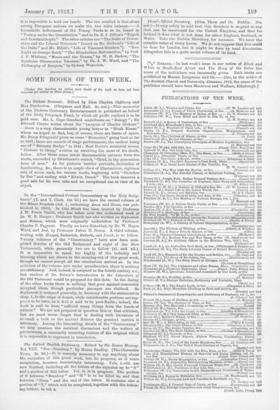In the "International Critical Commentary on the Holy Scrip- tures"
(T. and T. Clark. 12s. Cal.) we have the second volume of the Minor Prophets (vol. 1., containing Amos and Hosea, was pub. bushed in 1900. In this Micah has boon treated by Professor 3, M. Fowls Smith, who has taken over the unfinished work of Dr. W. R. Harper ; Professor Smith has also written on Zephaniah and Nahum, which were originally undertaken by Professor Charles P. Fiig-,nani. Finally we have Habakkuk, by Dr. W. Hayes Ward, and Joel, by Professor Julius H. Bower. A third volume, dealing with Haggai, Zechariah, Malachi, and Jonah, is to follow. Twenty volumes of the " Commentary " have now been com- pleted (twelve of the Old Testament and eight of the New Testament), while presently two arc to follow (xi. and xii.). It is impossible to speak too highly of the industry and learning which are shown in the carrying-out of this groat work, though we cannot accept all the conclusions arrived at. In the criticism of tho volume now under consideration thoro is nothing revolutionary. Joel, indeed, is assigned to the fourth Century n.c., but readers of Dr. Driver's Introduction to the Literature of the Old Testament would be prepared for this date. In the dating of the other books there is nothing that goes against commonly accepted ideas, though particular passages are obelizod. So Zephaniah is assigned generally, in harmony with the statement in chap. i., to the reign of Josiah, while considerable portions are sup- posed to be later, as ii. 8-11 is said to be post-Exilic; indeed, the book is said to have " suffered many things from the hands of editors." Wo are not prepared to question this or that criticism, but we must never forgot that in dealing with literature of so small a bulk as the ancient Hebrew the greatest caution is necessary. Among the interesting details of the "Commentary" we may mention the metrical discussions and the notices of paronomasia, a constantly recurring feature of the original which it is impossible to represent in translation.






















































 Previous page
Previous page